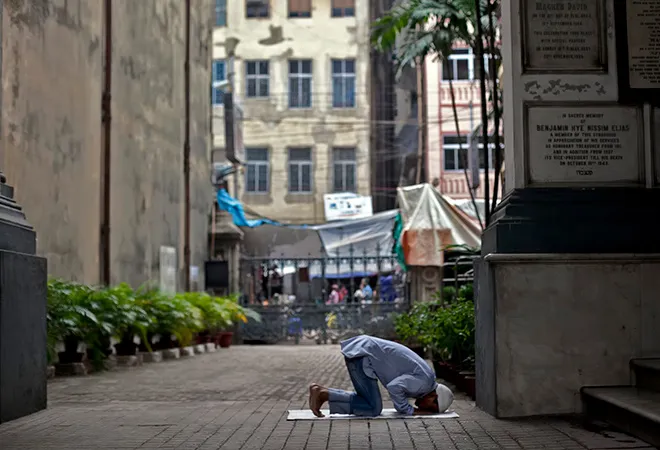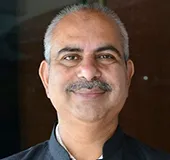-
CENTRES
Progammes & Centres
Location

Muslim community leaders want to engage and communicate with Prime Minister Narendra Modi after his emphatic victory in the recently concluded general elections.
Maulana Mahmood Madani, the general secretary of Jamiat Ulema-e-Hind, an influential body of Muslims in India, has written to Prime Minister Narendra Modi congratulating him on his victory for the second time and hoped that he will pay attention towards education, health and employment of minorities.
Madani told ORF that he was responding to Modi’s statement, made 48 hours after NDA’s spectacular victory when the prime minister promised to focus more on the poor and the minorities who had been “deceived” so far. Addressing first meeting of the newly elected NDA MPs in parliament, Modi said, “Unfortunately, minorities of this country have been kept in fear, used in elections. We have to end this cycle.” Making a case for winning trust and confidence of minorities, the prime minister had also remarked, “We have worked for Sabka Saath, Sabka Vikas, now we have to strive for Sabka Vishwas. The ones who vote for us, are a part of us. The ones who don’t, are also a part of us,” he said, stressing that no one must be left behind and there should be no discrimination.
Madani welcomed Modi’s statement and said he was hopeful that the new government will take some real and meaningful action to change the situation. “Your recent statement regarding your intention to pay special attention to the development of minorities, their education, health and employment instead of using them as vote bank is most welcome and timely. We hope it will be implemented in full earnestness and promptness,” Madani wrote to Modi adding, “The huge margin has proved that the people fully support your vikas agenda and expect you to steer our beloved country to the higher and higher goals of development, peace and prosperity. I hope your policy of ‘Sab Ka Saath and Sab Ka Vikas,’ the most important winning factor, will soon fulfill the dreams and goals set by you,” Madani said.
Madani led Jamiat Ulema-i-Hind, firmly rooted in Islam, has institutional ties with Deoband school of Islamic thought. Jamiat has completed 100 years in public life this year, batting for composite nationalism and rejection of two-nation theory. In the pre-Independent India, it had opposed the Muslim League’s demand for Pakistan and since 2001, is effectively using renowned Islamic seminary Dar-ul-Uloom, Deoband to issue comprehensive fatwas declaring terrorism as un-Islamic.
Madani feels if Modi lives up to his word, it will mark a new beginning and significant departure in the relationship between the ruling BJP-NDA and country’s Muslim population. As per 2011 census, Muslims comprise 14 per cent of India’s population. The 17th Lok-Sabha has elected 27 Muslim MPs in the Indian parliament, second lowest proportion of Muslim MPs in parliamentary history. The BJP had fielded seven Muslim candidates from its tally of 437 nominees. Saumitra Khan from Bengal is the lone Muslim representative from among the 303 Lok Sabha members of the BJP. BJP ally Lok Janshakti Party’s Mahbub Ali Kaiser is another Muslim MP belonging to the ruling NDA while other 25 Muslim members of 17th Lok Sabha are from the Opposition parties. As per CNN-NEWs18 — IPSOS exit poll survey, over 12 per cent of Muslims have voted for the BJP, up from 9 per cent in 2014.
Madani is not alone in thinking in terms of engaging Modi led BJP. Many prominent Muslim leaders and religious groups are veering round to the view that there is need to reach out to Modi. Representatives of All India Muslim Personal Law Board (AIMPLB), an apex body of various Muslim sects in the country, and other Muslim religious and social groups feel pre-election dust and rhetoric should settle down and there is need to make a “new beginning” and chalk out future course relating to Muslim community’s concerns. Madani is also member of AIMPLB executive.
Privately, many members of AIMPLB said they draw comfort with Modi’s insistence as being prime minister of entire 125 crore countrymen and declared policy of inclusive growth. They feel the community should not remain “prisoner” of the past. At the political turf, relations between Modi and Muslim community have remained strained. Zafar Sareshwala, Ahmedabad based community leader and businessman, who had been a notable Modi supporter, now says the prime minister has a real intention to carry all sections of the society along. Sareshwala points that unlike non-BJP regimes, Muslim youths were not falsely implicated in criminal cases.
The ties between Muslims and the BJP are far more complex and lacking mutual trust. A section of young Muslims, particularly young women, view the BJP as an option due to its stand on instant Triple Talaq, increase in funds for scholarships, preparations for competitive exams etc. As many as 2.52 crore minority students, half of them girls, have availed three scholarship schemes being offered by the Modi government.
According to Sareshwala, incidents of hate, mob lynching etc. are deeply problematic which need to dealt sternly by Modi regime. However, he tends to go by Meenakshi Ganguly, the south Asia director for Human Rights Watch who had recently remarked, “More than riots, Muslims fear the pinpricks. “It’s the Muslim vegetable vendor who is suddenly beaten up, it’s when Muslim families say they are worried about taking lunch boxes because they don’t know when they’re going to be accused of carrying beef. People feel entitled to impose their voices, and to do so violently, and there is no assurance the state will step in and protect them.” Meenakshi’s remarks figure in The Guardian.
Many Muslim community leaders, who do not share Sareshwala optimism but they feel Prime Minister Modi’s attention needs to be drawn towards community’s problems. The Muslim “wish-list” or charter of demands is long. Apart from general demands of seeking safety security, jobs and equal opportunities, Muslim community leaders want better management of Waqf boards and properties. During the UPA regime, there was demand for setting up an all India Waqf service on grounds that there are not many senior IAS officers available to head Waqf Boards in different states. The Central Waqf Act states that only senior IAS officers can be appointed their CEOs. The demand for All India Waqf Services has found support in Justice Rajindar Sachar Committee report and in the joint parliamentary committee on Waqfs.
Many Islamic scholars feel there is a need to bring in a special law to deal with the menace of mob lynching. The special law dealing with the atrocities against the scheduled caste and scheduled tribes — the SC/ST (Prevention of Atrocities) Act 1989 — may not have ended caste discrimination, but it has acted as a great deterrent, they argue.
Some community leaders want an amendment to the 1950 presidential order to make the scheduled castes religion-neutral. As per the existing rule, a scheduled caste member loses his “scheduled” status once he converts to Islam or Christianity and forfeits all attendant benefits. AIMPLB members want Modi government to make villages and wards (in urban areas), and not districts or blocks, units for planning of development schemes as central schemes meant for development of Muslim-concentrated districts have reportedly not reached to the targeted beneficiaries. There are many instances of central funds meant for minorities like setting up of educational institution and health care have been utilised five kilometres away from minority concentrated clusters.
At social level too, AIMPLB wants union government’s help in accelerating reforms within the community. Some AIMPLB members want to set up a corpus fund and a trust to assist destitute Muslim women who get divorced and face many hardships. Following Shahbano verdict in 1986, Rajiv Gandhi government had enacted a bill aimed at providing monetary assistance to divorced Muslim women but, there have been very few beneficiaries in last 28 years due to legal lacunae. Moreover, the judiciary at various levels has constantly been at loggerheads with Muslim personal law in matters relating to divorce.
The AIMPLB, though apolitical body, has in the past, taken lead to reach out to various prime ministers namely Indira Gandhi, Rajiv Gandhi, Narasimha Rao and Atal Bihari Vajpayee. The AIMPLB was formed in 1972 with a stated objective to protect Muslim sharia in civil matters as per constitutional provisions.
The views expressed above belong to the author(s). ORF research and analyses now available on Telegram! Click here to access our curated content — blogs, longforms and interviews.

Rasheed Kidwai is Visiting Fellow at Observer Research Foundation. He tracks politics and governance in India. Rasheed was formerly associate editor at The Telegraph, Calcutta. He ...
Read More +